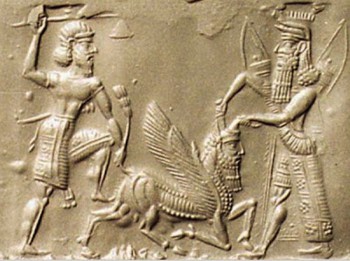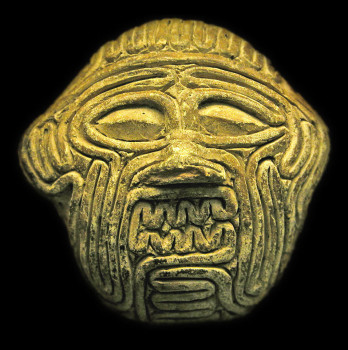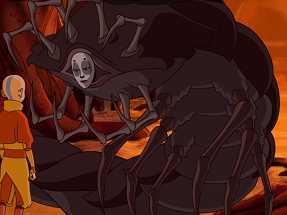Ancient Worlds: Killing Humbaba

We have a hero: Gilgamesh.
We have his best friend and sidekick: Enkidu.
Logical next step: find big monster and kill it.
Luckily, the Epic of Gilgamesh has one handy. This monster comes in the form of Humbaba, a being who is massive and terrifying, who was created to be “a terror to human beings” and who acts as a guardian of the Cedar Forests.
And frankly, he’s a really weird monster. As I’ve noted before, Mesopotamian myth feels very strange to us. Four-thousand years may be a blip geologically but anthropologically it’s a massive gulf. And as illustration, I offer up the fact that Humbaba’s face is usually depicted as being constructed out of intestines.

This image occurs several times. We have very little idea what it means. It is probably associated with divination: a popular way of telling the future in the ancient world was to sacrifice an animal, cut it open, and see what its innards look like. No, I am not making that up. Our ancestors were really weird. There seems to be some connection between Humbaba’s face being drawn in intestines and the appearance of his face in an animal’s innards as an omen of doom. It certainly makes for a fantastic and very cinematic image.
The Epic of Gilgamesh doesn’t describe Humbaba that way, though. Instead, he seems to have more in common with Koh the Face-Stealer, a demon found in the mythology of Avatar: The Last Airbender. His face changes several times during his battle with Gilgamesh and Enkidu; at one point in the text it seems (remember, we are missing large chunks of the story) that he has taken the face of Enkidu and is discouraging Gilgamesh.

But to the modern reader as a reader, the strangest thing might be that Humbaba, for all his terrors, isn’t much of a threat to anyone. He does his job. His job is to guard the forest. He was created by the gods for this purpose. He doesn’t go looking for victims, he doesn’t bother travelers, and he doesn’t carry beautiful maidens off at night. So as a target for our heroes, he seems a strange choice.
But as we’ve seen before and will continue to see, the Epic of Gilgamesh isn’t particularly interested in questions of good and evil. When Gilgamesh is acting by modern standards as a serial rapist, his people do not object to his behavior on the grounds that it is evil, nor do they ask for his destruction. They just want their king to get another hobby. So Humbaba is not to be defeated because he is evil, but because he is there. He is a great, massive, difficult to defeat foe, and the minute our heroes meet they decide to go defeat him.
So off they go. As they approach the forest where Humbaba dwells, Gilgamesh has a series of terrifying dreams. A mountain falls on him, the world burns around him, he’s defeated in battle by an enormous bull. Each time, he wakes up screaming, but Enkidu convinces him that his dreams, frightening as they are, are good omens. (Whether or not he was right will be our subject next week.)
At last, they reach the forest that Humbaba guards. When the monster appears he is defeated only with the help of Shamash, the god of winds, who pins Humbaba down with thirteen different blasts. Realizing he is beaten, Humbaba begs for mercy. When that fails (of course), he curses Enkidu (and Gilgamesh by extension) by dooming him to live a shorter life than his friend.
And that, of course, is when things take a turn for the worse.
Next time: The Bull of Heaven, and what not to do with its testicles.
That first image (with what you call the body of a horse) isn’t Humbaba, it’s the Bull of Heaven, and pretty obviously so.
Zoinkn: you’re right. I was led astray by Burkhardt, but the error is solely mine. I will edit the image but keep both these comments. Thank you.
[…] The pair take battle with Humbaba. Source: Black Gate. […]